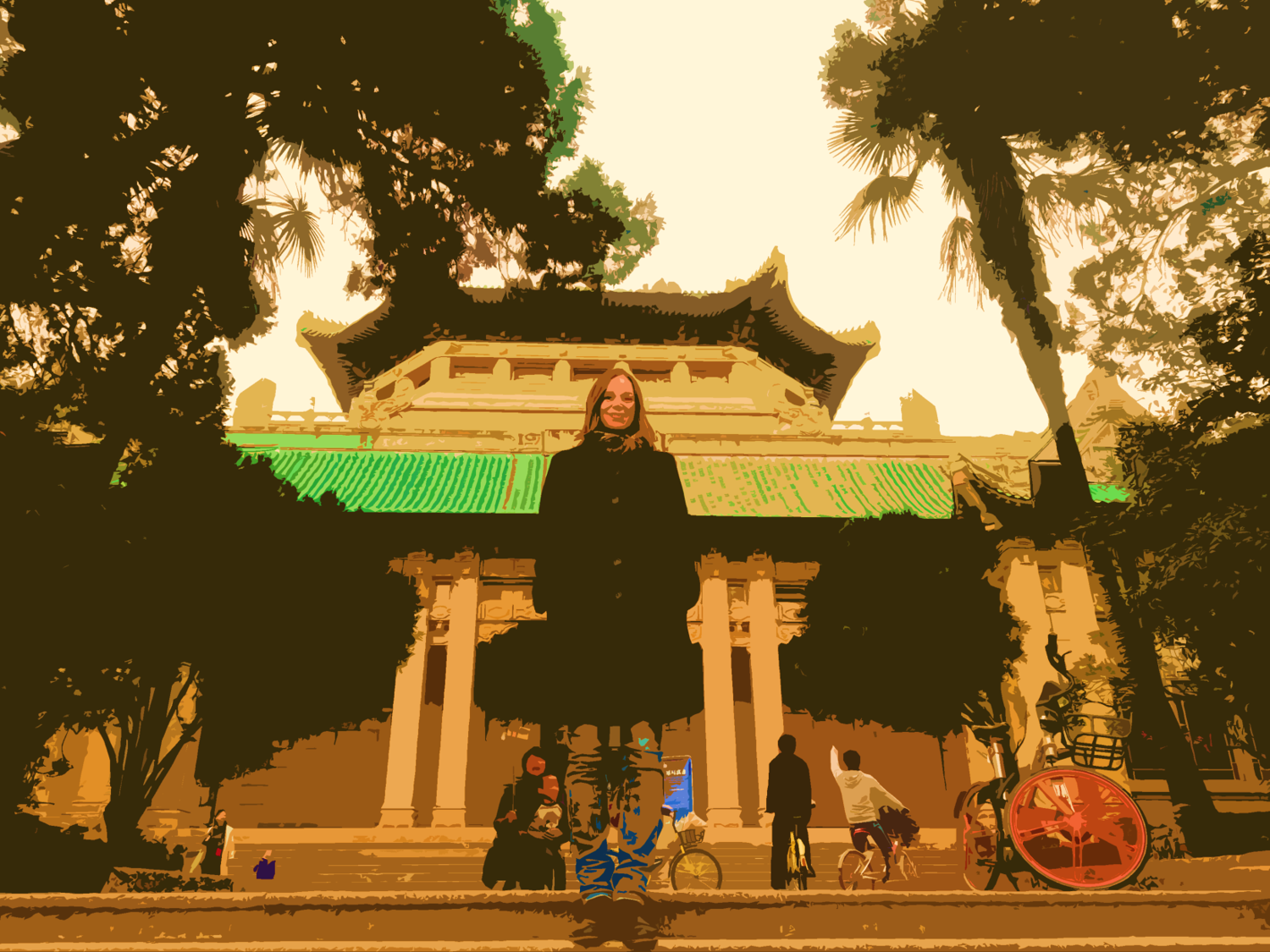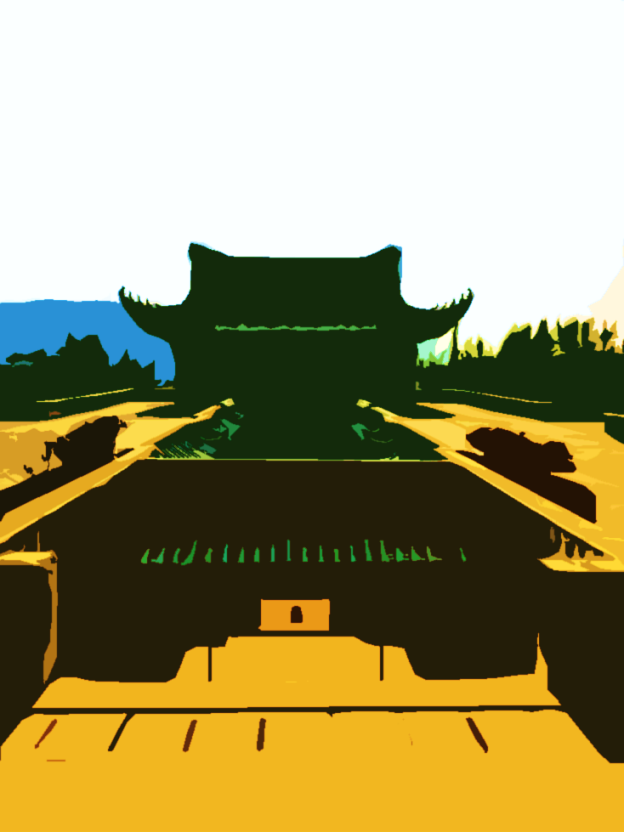
There are moments in life when we become one with history. Some might say we are always one with history. But that would be missing the point. What I have in mind is the kind of moment when everything around us suddenly begins to stand still. One of those moments occurred when I arrived at school one cold November morning in 1989 in a small East German town. I had just been told that my country’s borders had been opened. The mere thought was so immense that it took my brain two days to shiftback into gear.But it took much longer for the gravity of that moment to sink in. For that moment, when it became possible for people from East Germany to travel the world, was the moment that sent me on a curiosity-driven journey of discovery that eventually brought me here, to Luojia Shan.
Just as, from time to time, we seem to merge with history, we can also merge with places. One of those places is Luojia Shan. It draws us in and, once it has gotten hold of us, it never lets us go. The first time I set foot on Luojia Shan was in April 2016. It was a warm, rainy and misty day. In Ireland, where I was living at the time, rain always came in shades of cold. But here on Luojia Shan, both the rain and the place had something mystic about them. When, on that day, my Irish colleague jokingly asked: “Now, Ms S., how would you feel spending some time around here?” I said, “That would be nice,” while secretly thinking, “a dream!”. A conversation of consequence, for 18 months later I would call Luojia Shan ‘my home’. A dream had become reality. The attachment to this place was instantaneous, the moment forever imprinted in my memory.
A strong attachment to a place brings with it a sense of belonging. Separation from such a place can be accompanied by a sense of loss. When Wuhan went into lockdown in January 2020 and I found myself locked out of the city, unable to return to my home on Luojia Shan, I, along with many others, experienced that sense of loss. Initially mostly fearful for the people left behind and later wondering whether, when and how I might return.A year ago, it wasn’t only a moment but a seemingly endless period in history that made it impossible to imagine a time when life would be again how we had come to know it.
Three months ago today, I returned to Luojia Shan. When my plane landed at Tianhe Airport in Wuhan, I cried. The tears just came and I let them be. They carried with them almost a year’s worth of turmoil and pressure built up deep inside. With the tears came inner peace, marking a moment where I became one with myself.
Seeing friends again, hugging– much more tightly than before – seemed like a gift. In those early days back in Wuhan, which followed a long period of self-isolation in Germany where distance meant keeping away even from close family and friends, followed by four weeks of quarantine here in China, it was hard to re-adjust to close contact with people. But, increasingly, I ventured out, cherishing every single moment.
This evening, walking through campus and merging with the sea of people, many of whom have travelled from afar to watch the annual blooming of the famous Luojia cherry blossoms, I sensed it again for a moment. That feeling of becoming one with history. The simple fact that it is possible for all these people to be here, right now, seems so distant from people’s experiences here exactly a year ago. It is also far, in physical terms, from where I myself was a year ago.
When people back home ask me, “Why Wuhan?” I try to put in words what I feel for this place but words fail to capture that sense of feeling one with a place. There are moments in life when we connect with someone or some place and the reasons are beyond us – psychologists might offer explanations for why we have a sense of feeling one with another person, but what explanations are there for feeling one with a place?What makes us become a part of somewhere? What makes us belong? Who really knows? All I can say is that when I go on my daily walks across campus and into the surrounding areas, when I sit outside the Old Library or at the lake with my friend, humming along to songs, when I stare at the setting sun or listen to the birds around me, I feel one with this place.
There are still instances when I recognise loss. I miss the couple who used to sell the best 梅菜扣肉饼*in Wuhan just outside the main gate and I wonder what happened to them. I miss the people in the fruit shop on Guangba Road where I used to stop off on my way home and I wonder what happened to them. I miss the owner of the Snail Bar on Bayi Road who used to talk with pride of his German brewing skills and who always had a good wheat beer waiting for us – what happened to him? There are other people I miss. Every single one of them was part of life on and around Luojia Shan.Now they are gone, though I remain hopeful that some of them will return.
So much, it seems, has been lost. But a lot has also been gained. I feel touched by the warmth and kindness I meet everywhere, extended towards a stranger by people who, only a year ago, were engulfed in distress and uncertainty.It is the little bonds created during fleeting moments – be it the lady in the fruit shop outside the main gate putting a sweet into my bag with her eyes searching mine while saying “慢走”**, or the street sweeper on Luoshi Road wishing me a “Happy New Year” just at the moment when I painfully missed my family and who now stops to chat every time he sees “the German” enter his territory, or the security guard at the Guangba Road gate who greets me with a smile and a friendly“hello, teacher”every time I pass. It is also the food brought to my door by colleagues and friends during quarantine, a gift delivered to my apartment for New Year’s, a flower at my door, a friend helping me communicate, or a trouble shared. All of this reminds me that I belong here.
More recently, it is also the many ‘hellos’ from students passing and the sense of achievement I feel every time I manage to recognise a face and match it with the right name, bumping into people I haven’t seen for more than a year, seeing a favourite local band in concert, being taken on a private heritage tour of old Hankou, or being invited to join a private family in their ancestral hall in the mountains of Hubei province. It is these little moments and it is tonight when,walking across campus, among the cherry-blossom viewing crowds on Luojia Shan, I again have a sense of becoming one with history. This time, though, unlike that moment in November 1989 when the Berlin Wall came tumbling down and I lost my country, or that day in January 2020 when the life of every single person in Wuhan was transformed and when many people whose lives are closely intertwined with this city found themselves stranded somewhere else in the world, this moment tonight has brought me hope for a return to the life we lost just over a year ago. It begins here. It begins for me with a feeling of being one with Luojia Shan.

* 梅菜扣肉饼(méicáikòuròubǐng) is a popular Chinese street food, a type of flatbread
**慢走(mànzǒu) is a common greeting extended to people who are taking their leave, meaning ‘Take care!’
About the author
Originally from a small town in the Eastern part of Germany, Sylvia Schroeder has travelled extensively, lived in different countries and describes herself as a passionate interculturalist. Following a career in international education, which saw her heading up the international office at one of Ireland's most dynamic universities, followed by a stint as director for international engagement with a special remit for strategic partnerships in North East Asia for the same university (which first brought her to Wuhan University on secondment from 2017), Sylvia chose to relocate to Luojia Shan permanently in December 2019. She now lives on the beautiful campus of Wuhan University and lectures in intercultural communication. She also researches at the intersection of all things digital and intercultural and spends her spare time exploring her surroundings. When something moves her, she writes about it.


